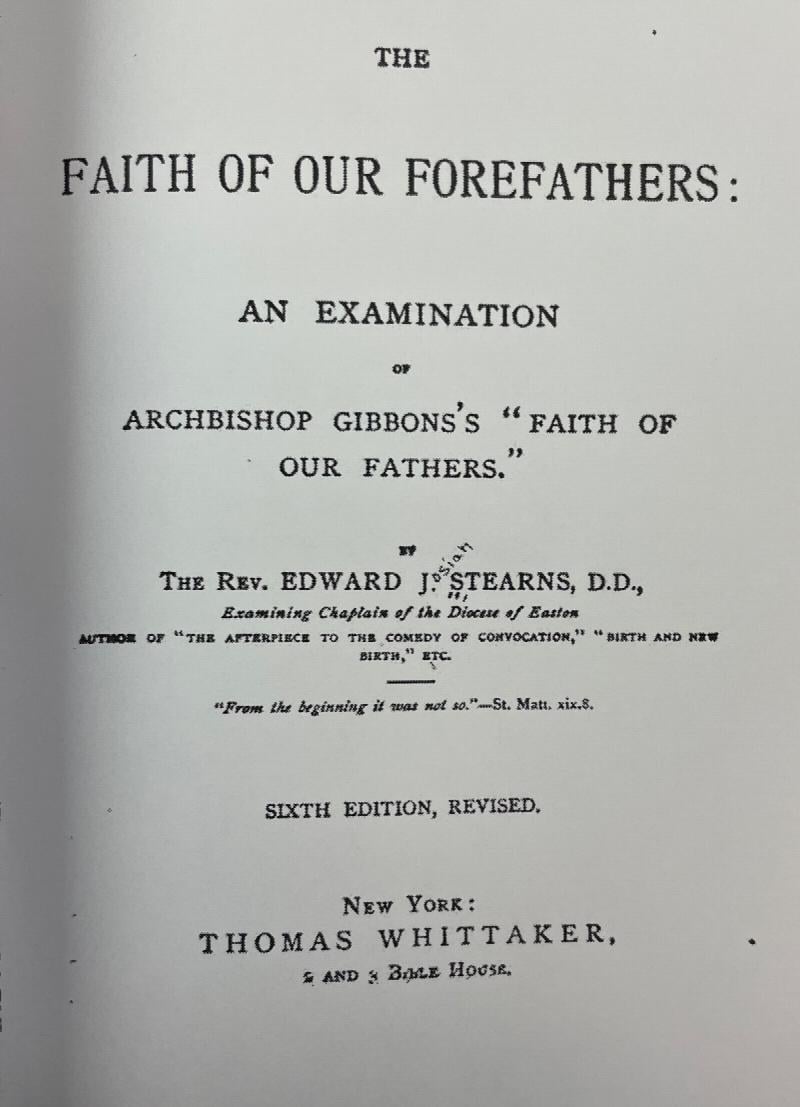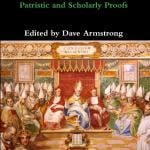Particularly With Regard to Being Led by the Holy Spirit

Edward Josiah Stearns (1810-1890) was an Episcopal clergyman from Maryland and author of several books. His volume, The Faith of Our Forefathers (New York: Thomas Whittaker, 1879), was a reply to The Faith of Our Fathers (1876), by James Cardinal Gibbons (1834-1921), one of the best and most well-known Catholic apologetics works, with an emphasis on scriptural arguments and replies to Protestant critiques of Catholicism. It had sold over 1.4 million copies by the time of its 83rd edition in 1917 and was the most popular book in the United States until Gone With the Wind was published in 1939. This volume highly influenced my own development as a soon-to-be Catholic apologist in the early 1990s: especially with regard to my usual modus operandi of focusing on “biblical evidence” for Catholicism.
The words of Rev. Stearns will be in blue, and those of Cardinal Gibbons in green. I use RSV for biblical citations.
***
Another “shining mark” of the Church, though not contained in the creed, is, according to the Archbishop, her ” Infallible Authority.”
“That the Church was infallible in the Apostolic age, is denied by no Christian. We never question the truth of the Apostles’ declarations; they were, in fact, the only authority in the Church for the first century. The New Testament was not completed till the close of the first century. There is no just ground for denying to the Apostolic teachers of the nineteenth century in which we live, a prerogative clearly possessed by those of the first, especially as the divine Word nowhere intimates that this unerring guidance was to die with the Apostles” (p. 83).
There is an unmistakable “intimation” in St. John, 14:25, 26, that this guidance was “to die with” them: “These things have I spoken unto you, being yet present with you. But the Comforter, which is the Holy Ghost, whom the Father will send in my name, he shall teach you all things, and bring all things to your remembrance, whatsoever I have said unto you.” The part I have italicized, confines the promise to the Apostles; it is physically impossible that it should be fulfilled to their successors. (pp. 47-48)
This is very odd exegesis. Rev. Stearns seems blissfully unaware that the disciples and apostles represented Christian authority in perpetuity. The Holy Spirit was to be the Guide and Helper of Church leaders. It makes no sense that this was to be the case only for the apostles, and then cease to exist. But such is the bankruptcy in many Protestant circles with regard to the continuance of charismatic gifts. The Protestant Benson Commentary states: “Here is a clear promise to the apostles, and their successors in the faith, that the Holy Ghost should teach them all that truth which was needful for their salvation.”
But if a Protestant wishes to claim that this promise of profound assistance from the Holy Spirit applied only to the disciples — despite the fact that the Holy Spirit indwells every believer — , then he would have to explain why St. Paul casually assumes that He would also be operative as a spiritual Guide for each non-apostle Gentile Christian (thus, by extension, every Christian at all times):
Romans 8:14, 16 For all who are led by the Spirit of God are sons of God. . . . it is the Spirit himself bearing witness with our spirit that we are children of God,
Romans 8:26 Likewise the Spirit helps us in our weakness; for we do not know how to pray as we ought, but the Spirit himself intercedes for us with sighs too deep for words.
1 Corinthians 2:14 The unspiritual man does not receive the gifts of the Spirit of God, for they are folly to him, and he is not able to understand them because they are spiritually discerned.
1 Corinthians 3:16 Do you not know that you are God’s temple and that God’s Spirit dwells in you?
1 Corinthians 12:3 Therefore I want you to understand that no one speaking by the Spirit of God ever says “Jesus be cursed!” and no one can say “Jesus is Lord” except by the Holy Spirit.
1 Corinthians 12:7-11 To each is given the manifestation of the Spirit for the common good. [8] To one is given through the Spirit the utterance of wisdom, and to another the utterance of knowledge according to the same Spirit, [9] to another faith by the same Spirit, to another gifts of healing by the one Spirit, [10] to another the working of miracles, to another prophecy, to another the ability to distinguish between spirits, to another various kinds of tongues, to another the interpretation of tongues. [11] All these are inspired by one and the same Spirit, who apportions to each one individually as he wills.
2 Corinthians 3:17-18 Now the Lord is the Spirit, and where the Spirit of the Lord is, there is freedom. [18] And we all, with unveiled face, beholding the glory of the Lord, are being changed into his likeness from one degree of glory to another; for this comes from the Lord who is the Spirit.
Galatians 5:18 But if you are led by the Spirit you are not under the law.
Ephesians 3:5 which was not made known to the sons of men in other generations as it has now been revealed to his holy apostles and prophets by the Spirit; [prophets were not apostles, and the office of prophet and gift of prophecy is present in the new covenant and continues on, as is assumed in the New Testament]
Hebrews 10:15 And the Holy Spirit also bears witness to us; . . .
2 Peter 1:21 because no prophecy ever came by the impulse of man, but men moved by the Holy Spirit spoke from God.
This charism was to be passed on in a special way to the leaders of the Church:
2 Timothy 1:14 guard the truth that has been entrusted to you by the Holy Spirit who dwells within us. (cf. Acts 15:28 below)
The Archbishop’s argument is, An infallible God cannot create a fallible Church. He might as well argue that an infallible God cannot create a fallible man. We know that an infallible God did create a fallible Church, to wit, the Jewish; the fact, therefore, that the Catholic Church was created by an infallible God, is no proof that she is herself infallible. (p. 51)
That’s true as far as it goes, but is a non sequitur, since the Bible teaches — apart from all of these observations — that the Church is infallible:
1 Timothy 3:15 . . . the church of the living God, the pillar and bulwark of the truth. [see my explanation as to why this passage absolutely proves ecclesial infallibility]
Acts 15:28 For it has seemed good to the Holy Spirit and to us to lay upon you no greater burden than these necessary things: . . . [this is a council of the Church in Jerusalem at that time, led by “apostles and elders” (16:4) — elders not being apostles — and prevented from error by the Holy Spirit Himself; hence, infallible]
Acts 16:4 As they [Paul and Silas] went on their way through the cities, they delivered to them for observance the decisions which had been reached by the apostles and elders who were at Jerusalem. [the decrees from the council were binding on Christians far and wide; this is assuredly not a local church ecclesiology. Silas was also a prophet (15:32)]
Now, one might argue about where this infallible Church is to be found, or whether it is the Catholic Church led by popes, but the Bible undoubtedly teaches that the Church was to be infallible: in the general assertion of 1 Timothy 3:15 and the concrete application and exercise of this authority at the Jerusalem Council: to which even St. Paul is bound.
In the same chapter, Rev. Stearns trots out the obligatory polemical arguments regarding Popes Vigilius and Honorius, who supposedly disproved the decree on papal infallibility in 1870 at Vatican I in their beliefs and actions (they did not). What he doesn’t do (also almost obligatory) is present the Catholic counter-argument in each case. I have several links which will provide that service to my readers:
Dialogue on (Supposedly Fallible) Pope Honorius [1997]
Honorius: Disproof of Papal Infallibility? [2007]
*
*
*
***
*
Photo credit: Image of the title page of The Faith of Our Forefathers (New York: Thomas Whittaker, 6th edition, 1879), by Edward Josiah Stearns [public domain / Bookmarxbooks page for this title]
Summary: Reply to Anglican Edward Josiah Stearns regarding the Church’s infallibility, including passages about the Holy Spirit’s leading, 1 Timothy 3:15, & the Jerusalem council.













